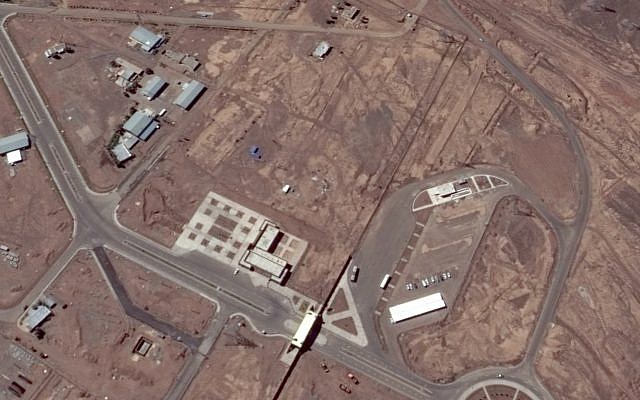According to the IAEA, Iran’s total stockpile of enriched uranium now stands at 6,201.3 kilograms (13,671.5 pounds.)
By JNS
France, Britain and Germany (the E3) submitted a draft resolution to the International Atomic Energy Agency’s Board of Governors on Monday pressing Iran on uranium traces at undeclared sites and the barring of inspectors, according to text seen by Reuters.
The draft, which will be voted on this week, calls on Tehran to cooperate without delay on a years-long investigation by the U.N. nuclear watchdog into the traces, including by letting the IAEA collect samples if necessary.
It also calls for Iran to allow IAEA uranium-enrichment experts on the inspection team, which Tehran has barred, and urges Tehran to implement a March 2023 joint statement that pledges cooperation.
“[The Board] calls on Iran to provide sufficient cooperation with the Agency and take the essential and urgent actions as decided by the Board in its November 2022 resolution, to resolve safeguards issues which remain outstanding despite numerous interactions with the Agency since 2019,” the text reads, according to Reuters.
The draft follows up on the previous resolution, that was passed 18 months ago.
Iran’s nuclear chief Mohammad Eslami was quoted by the semi-official Fars news agency as saying that the Islamic Republic would react if the resolution passes.
The Europeans are aiming to pass the new resolution after not moving forward at the last IAEA meeting in March after the Biden administration expressed opposition to the move.
A senior European diplomat claimed that the United States is having “difficulty” moving ahead with the resolution.
The diplomat added that “in our conversations we continue to do everything to convince them.”
The Wall Street Journal cited diplomatic sources as saying on May 27 that the Biden administration has pressed a number of other countries to abstain in a censure vote, saying that is what Washington will do.
Iran’s stockpile of 60%-enriched uranium has increased by 20.6 kilograms (45.5 pounds) since February, AFP reported on May 27, citing a new confidential IAEA report.
The document, which was also seen by the Associated Press, revealed that Tehran has accumulated 142.1 kilograms (313.2 pounds) of uranium enriched up to 60%. This level of enrichment is just a technical step from 90% enrichment, considered weapons grade.
According to the IAEA definition, it is technically possible to create an atomic bomb with roughly 42 kilograms (92.5 pounds) of uranium enriched to 60% if the material is further enriched to 90%.
Iran has continued to ramp up enrichment, while maintaining that its nuclear program is strictly peaceful.
However, Western powers claim there is no credible civilian explanation for Tehran’s nuclear activities. In 2022, the IAEA issued a report saying it could not “provide assurances that Iran’s nuclear program is exclusively peaceful.”
According to the IAEA, Iran’s total stockpile of enriched uranium now stands at 6,201.3 kilograms (13,671.5 pounds)—a 675.8 kilogram (1,489.8 pound) increase in three months.
Following meetings with officials in Iran earlier this month, IAEA chief Rafael Grossi told reporters that Tehran’s cooperation with the organization has been “completely unsatisfactory” in recent months and urged the country to adopt “concrete” measures to address concerns.
There have also been recent Iranian threats of a push towards the bomb. On May 9, an adviser to Supreme Leader Ali Khamenei said Tehran will weaponize its nuclear program if Israel “threatens its existence.”
Two weeks ago, a lawmaker close to the regime suggested that the country might already possess an atomic bomb, saying, “In my opinion, we have achieved nuclear weapons, but we do not announce it.”





